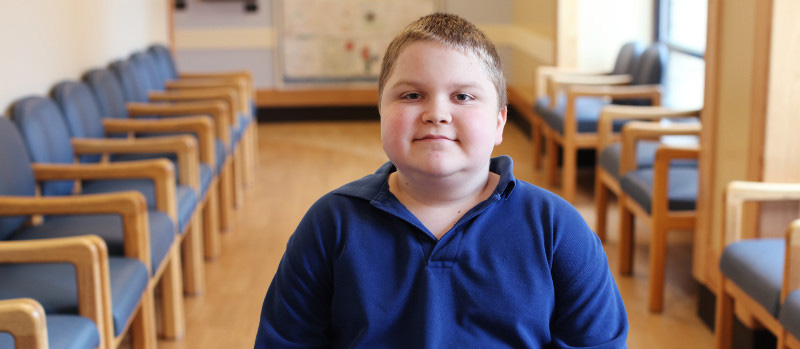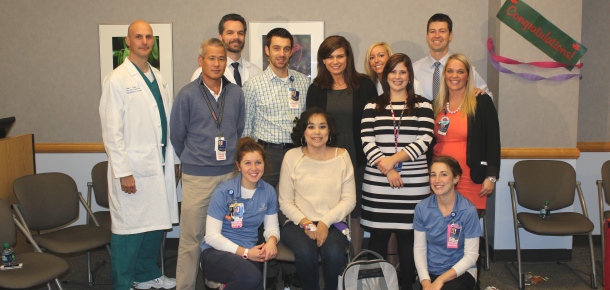When parents first learn that their child has Duchenne muscular dystrophy (DMD), they are understandably worried. DMD is a genetic disease that causes muscles to weaken slowly over time.
DMD is commonly diagnosed in childhood, when kids start missing major milestones such as crawling or walking. As the disease progresses, the heart, which is also a muscle, will weaken as well.
Because overall treatment has vastly improved for DMD over the last couple of decades, the heart has become a major focus area for both doctors and researchers. Our goal is to slow the deterioration of the heart muscle so that we might be able to slow down the development heart failure. As a cardiologist who specializes in the treatment of Duchenne muscular dystrophy, I’d like to share the top five things to know about the heart as it relates to this condition:
Top 5 Things to Know About the Heart in Duchenne Muscular Dystrophy
1. When Heart Problems First Show Up
Typically when patients have Duchenne muscular dystrophy, heart problems show up around the second decade of life. Some children may have problems that start before the age of 10, which is why we recommend cardiac screening before then.
2. Warning Signs of Cardiac Problems
The warning signs of cardiac problems for patients with DMD can be tricky. When the heart isn’t working well, it isn’t pumping blood to some parts of the body and may back up into other parts. The first place blood often backs up into is the lungs. Kids can be short of breath, have a chronic cough, or appear to have a viral infection or asthmatic problems that are new and won’t go away. Similarly, when the heart isn’t working well, blood isn’t flowing efficiently to the stomach or intestines. This can look like a lack of hunger or even vomiting when there’s no other reason for it. If your child with DMD has new or ongoing breathing or stomach symptoms, I recommend speaking to your child’s doctor about it to make sure he or she think the heart is still doing well.
3. Screening Tools
Cardiac screening, such as echocardiography or cardiac MRI, can help us watch for early warning signs of heart problems. For kids around ages 5 or 6, we recommend yearly echocardiography. This test uses ultrasound to visualize the structure and function of the heart. Then around ages 8-10, we will conduct yearly cardiac MRIs. This test can identify scarring, or fibrosis, before heart function is impacted. For instance, some kids can have a perfectly functioning heart and be asymptomatic, but will have fibrosis show up on their cardiac MRI. This can be one of the earliest warning signs that the heart muscle is starting to weaken. Identifying the early warning signs can help us begin treatment sooner and monitor heart function more frequently.
4. Treatments available
Typically, we start angiotensin-converting enzyme (ACE) inhibitors in kids around the age of 10. We may start ACE inhibitors earlier if there are decreases in heart function or fibrosis is found on cardiac MRI. There is evidence to suggest that starting it early, may slow the progression of heart disease. Another group of medications, aldosterone receptor antagonists (spironolactone or eplerenone), are also used to slow progression of cardiomyopathy once fibrosis is found on cardiac MRI. Finally, once cardiac dysfunction develops we will also start a beta-blocker, most commonly carvedilol, to slow progression of cardiomyopathy.
Research also suggests that steroids may also slow the development of the disease in the heart just like in other muscles. We are still trying to understand if this is direct effect on the heart or due to improvement on overall health from having stronger muscles for longer.
For patients who have very severe heart dysfunction, an implantable cardioverter-defibrillator (ICD) may be an option to decrease the risk of having an abnormal heart rhythm. This device is placed under the skin and monitors heart rate. It will administer an electric shock to return the heart to a normal heart rhythm if it detects an abnormal one. Not every child with DMD and with heart dysfunction needs an ICD and we are still understanding which patients with DMD may benefit most from having an ICD.
In patients where the dysfunction is so severe that blood is barely being pumped throughout the body, a VAD, or a ventricular assist device, may be an option. This device mechanically supports the heart and improves blood flow throughout the body when the heart is failing. Just like with ICDs, not every child with DMD and with heart failure will do better with a VAD, but it may be an option to consider with your cardiology and neuromuscular team.
5.Genetic testing
Because DMD is genetic and happens on the X chromosome, we recommend genetic testing on both the moms and sisters of boys with DMD. This helps us understand which family members should be followed and screened for the development of heart muscle disease.
The good news is that patients with DMD are surviving longer. And we hope for that trend to continue with the many physicians and researchers here and throughout the country who are dedicated to improving long-term outcomes for these patients.
To learn more about our Neuromuscular Cardiology Clinic, please visit our website or call 513-636-4336.





